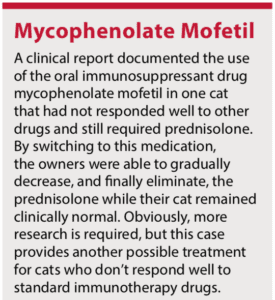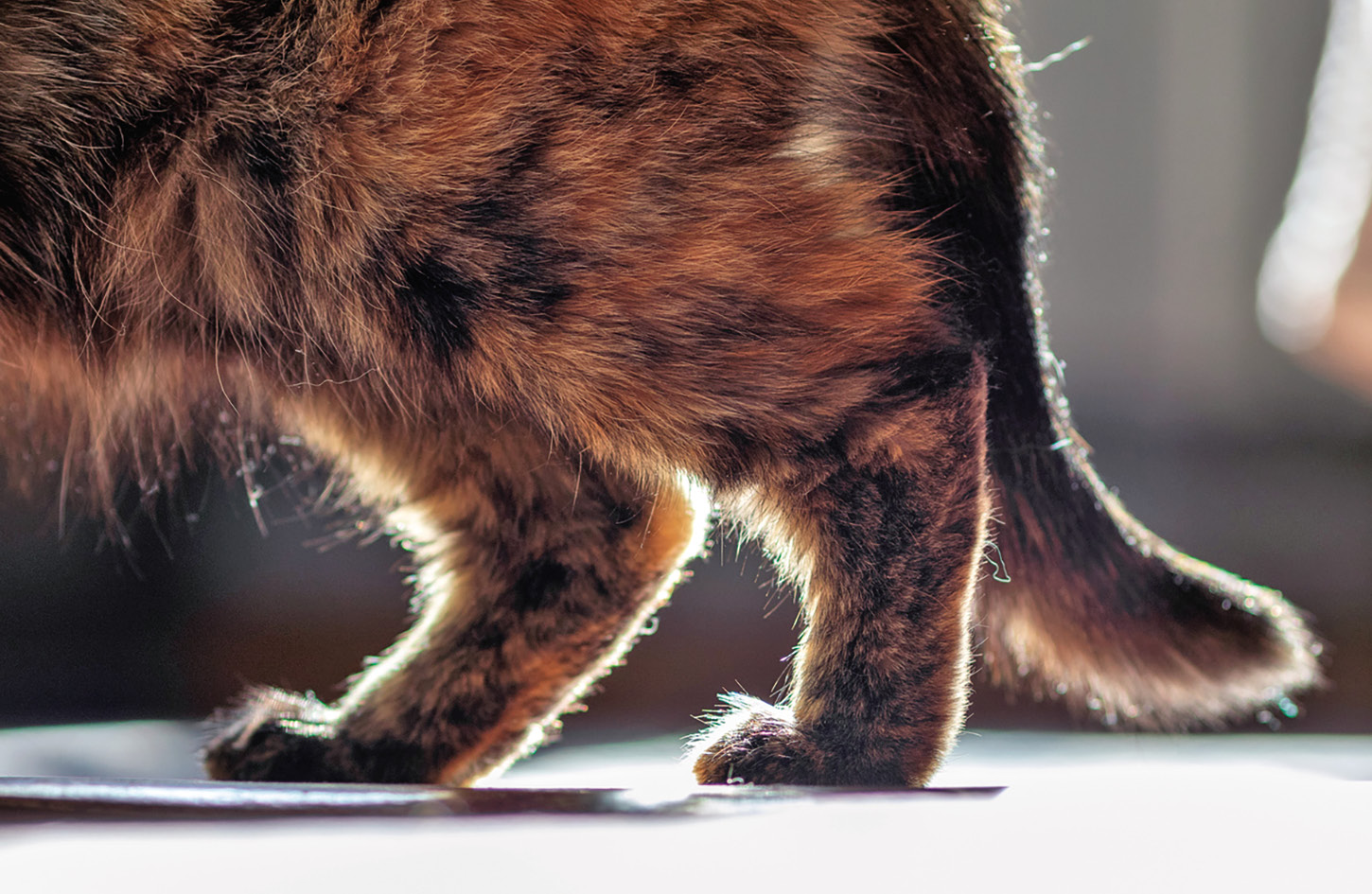Mycophenolate Mofetil
A clinical report documented the use of the oral immunosuppressant drug mycophenolate mofetil in one cat that had not responded well to other drugs and still required prednisolone. By switching to this medication, the owners were able to gradually decrease, and finally eliminate, the prednisolone while their cat remained clinically normal. Obviously, more research is required, but this case provides another possible treatment for cats who don’t respond well to standard immunotherapy drugs.
We’re all familiar with osteoarthritis, which is due to the breakdown of cartilage, usually because of repeated stress on the joint. Cats can suffer from osteoarthritis, too, but they also may develop a more painful condition called feline immune-mediated polyarthritis (IMPA).
Some forms of IMPA can be erosive, such as feline chronic progressive polyarthritis (FCPP), which is like rheumatoid arthritis in people. Other forms are non-erosive, like systemic lupus erythematosus, which mirrors systemic lupus erythematosus in people. Both types produce inflammation, pain, and difficulty with movement.
IMPA is a relatively rare condition, so other conditions are more likely to cause lameness or joint issues in cats, says John P. Loftus, PhD, DVM, section chief of small animal medicine at Cornell University’s College of Veterinary Medicine. Still, if IMPA is suspected, your cat needs an accurate diagnosis, achieved by a thorough diagnostic workup, including possibly joint taps to look at the cells in the joint fluid.
Signs of IMPA may include:
- Pain
- Fever
- Lack of appetite
- Reluctance to move, even if forced
- Swollen joints
- Misaligned or dislocated joints
- Radiographs showing erosive changes to the joints
Causes
IMPA is an autoimmune issue, which is when the body attacks its own tissues. The stimulus for this change in normal inflammatory cell behavior can vary and may not be identifiable.
Causes of IMPA include various infectious agents and hypersensitivity reactions to medications or vaccines. FCPP has been connected to feline leukemia virus, feline immunodeficiency virus, and feline foamy virus infections. It occurs primarily in male cats that are 1 to 5 years old and genetic susceptibility may be involved.
Recent studies suggest feline calicivirus as a cause, but vaccination may help prevent some of these cases, says Dr. Loftus. The feline calicivirus vaccine is a core vaccine, meaning every cat should receive it. Vaccines rarely cause immune-mediated conditions.
Diagnosis
Diagnostics will include bloodwork to evaluate the cat’s immune system and look for rheumatoid factor and antinuclear antibodies. Radiographs may be used to verify any erosive or proliferative bony changes around the affected joints. Your veterinarian may also take a sample of the cat’s joint fluid for analysis.
If infectious agents are involved in your cat’s joint problems, they must be treated. For example, if your cat has bacteria in her joint fluid, possibly from a tiny bite wound, antibiotics may help. In addition, cancer needs to be ruled out.
Treatment
Pain medication and corticosteroids are usually prescribed. “The primary treatment is generally a glucocorticoid (corticosteroid) like prednisolone. Additional drugs such as cyclosporine or mycophenolate (immunosuppressive drugs) have been used to treat this condition in cats that didn’t respond to prednisolone alone. In one case series, several cats were treated with meloxicam, which is a non-steroidal anti-inflammatory drug (NSAID) for pain, but I would avoid NSAIDs because the cats will likely need to switch to a glucocorticoid if they don’t respond,” says Dr. Loftus.
 That’s because switching from anti-inflammatories to corticosteroids requires a tapering off process, which means the cats are untreated during that time. Some cats will relapse during a medication taper, while others may relapse later. Unfortunately, not all cats respond well to treatment.
That’s because switching from anti-inflammatories to corticosteroids requires a tapering off process, which means the cats are untreated during that time. Some cats will relapse during a medication taper, while others may relapse later. Unfortunately, not all cats respond well to treatment.
Cytotoxic drugs such as cyclosporine show efficacy toward stopping or slowing IMPA progression, essentially putting your cat into remission. Existing damage is not repaired, however.
Additional pain medications are often needed to assure a reasonable quality of life. Physical therapy, massage, and laser treatments may help with comfort.




